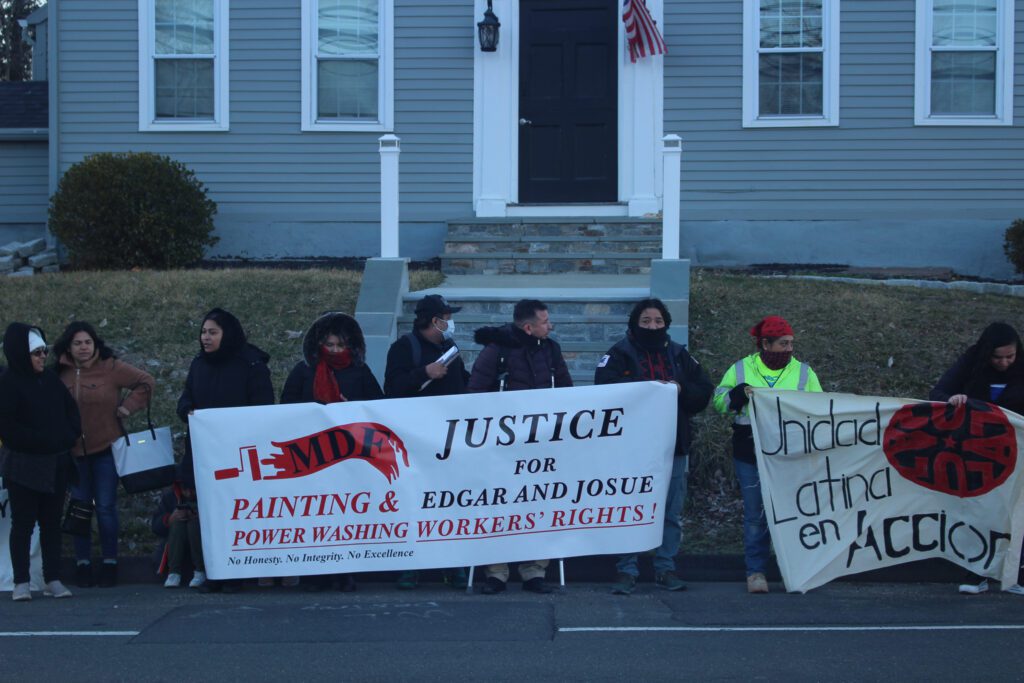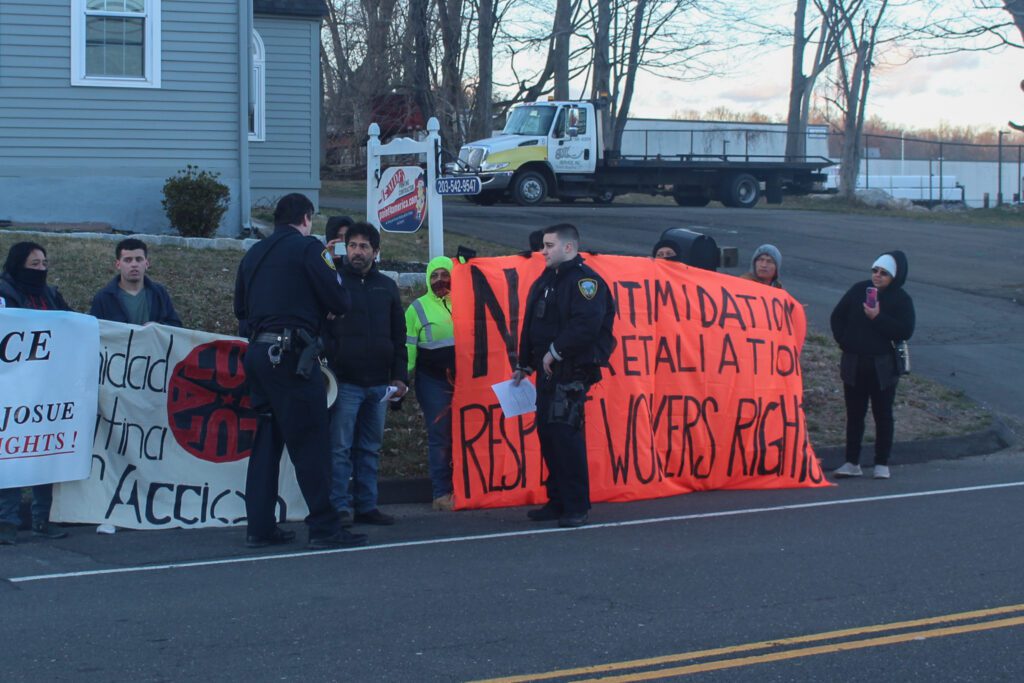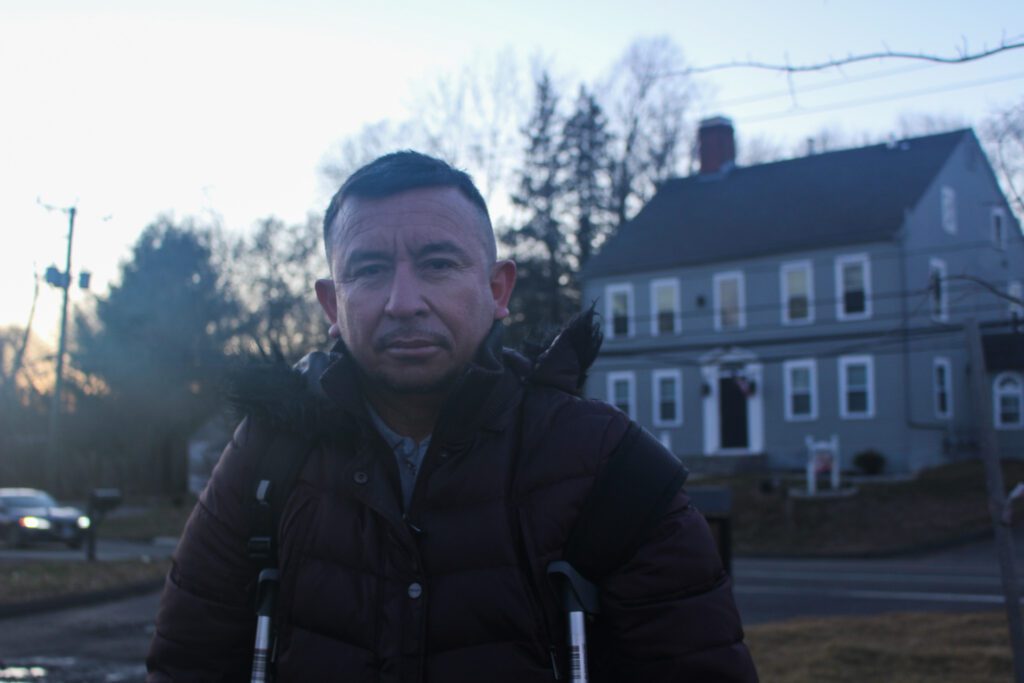Landlord-boss attempts second eviction of migrant workers, contests work compensation as activists mount pressure
MDF Painting & Power Washing sent Edgar Becerra and Josue Mauricio Arana their second eviction notices on Feb. 11. Unidad Latina en Acción has denounced the company for exploitation in weekly protests.

Laura Ospina, Contributing Photographer
Migrant worker activists protested in front of MDF Painting & Power Washing offices for a second time this Thursday, Feb. 29.
The protest comes as The Hartford, MDF’s insurer, prepares to challenge the workers’ compensation case of Edgar Becerra, according to Tyrese Ford, Becerra’s housing court attorney. Becerra, a Guatemalan migrant and former employee of MDF, says that he suffered lower spine injuries after falling from a 32-foot ladder and a two-story window. Becerra claims that MDF did not provide workers with safety training or equipment.
MDF founder Mark DeFrancesco also moved to evict Becerra and Josue Maurcio Arana, another tenant-employee awaiting a workers’ compensation case, on Feb. 11, according to Ford. The eviction is DeFrancesco’s second attempt, his first blocked by the Connecticut Superior Court on Feb. 5. This time around, DeFrancesco used the grounds of “right or privilege terminated,” or the fact that Becerra and Arana have not paid rent, an approach suggested by Judge Walter Spader in his Feb. 5 decision.
Becerra said he will continue to fight for compensation for his injuries and lost time, not only for himself and his family but for other migrant workers who have encountered an “American nightmare.”
“One of the things that has motivated me is not only to win compensation for the harm and physical damages that I’ve been living with but also in my heart, I have a wish to leave a precedent before the American people and before the conscience of many companies that are laborally, cannibals,” Becerra said in Spanish.

Glen Formica, Becerra’s workers’ compensation attorney, described Hartford Insurance’s decision to contest Becerra’s claim as “unusual.” Formica said that about 90 percent of the cases he has worked on go uncontested. Formica added that he didn’t understand the motivation behind contesting.
“You get a golden ticket, you have authorized workers who are going to work their hardest for you and show up for work, happy to be there every day,” Formica said. “Why would they be putting all this in jeopardy over one guy that gets hurt on the job?”
After multiple requests for comment, MDF directed the News to John Walsh of Licari, Walsh & Sklaver, their legal representation. Walsh did not immediately respond to the request for comment.
Approximately 20 members of Unidad Latina en Acción, including Becerra on crutches, protested in front of MDF offices in North Branford on Thursday. ULA had previously held a protest on Feb. 23. Chanting “Shame on MDF!” ULA members charged MDF with exploiting and intimidating their workers.
About ten minutes into the protest, an MDF employee called the police. Four Branford Police Department officers arrived and eventually left once they confirmed that the protestors were not blocking the road, according to BFD Sergeant Christopher Romanello.

ULA members also condemned what they called an “act of intimidation” against Becerra outside of 200 Peck St., where he lives, on Saturday. Becerra said that an unknown man followed him, told him he had a message from “the boss,” and said that if he did not drop his workers’ compensation complaint, he would “return to [Guatemala] in a wooden box.”
The News was unable to independently verify these claims.
“I protested to support [Becerra] because he doesn’t have a job or money for food,” Alexandra Rodriguez, a ULA member at the protests, said in Spanish. “[Becerra’s situation] could happen to any of us. We need to support others and make sure people who don’t have family in the area feel supported so that this group is their family.”
Roselia Aquino, another ULA member who attended the protests, said that, like Becerra, her brother-in-law suffered a workplace fall when fixing the roof of a house without safety equipment. Aquino condemned the boss’s practice of making workers buy their own safety equipment, saying that it should be the boss’s responsibility. Two years later, Aquino said that her brother-in-law still needs surgery.
Becerra’s “labor torment”
Becerra said that MDF eroded his dignity as a worker on his first day of working for the company in July. When he first arrived in New Haven on a working visa sponsored by MDF, Becerra said he was shown his accommodation for the next several months: an approximately 8-by-8-foot room to be shared by three people, with mattress pads on the ground as the only furniture.
Between July and September 2023, Becerra, along with other migrant workers, painted and remodeled houses for MDF. Becerra told the News that throughout these months, MDF transported workers “like animals and tools” to work sites. On top and among construction tools, workers would wait in the back of a van among construction tools with no seats for up to two hours, according to Becerra.

This was before Becerra suffered two serious workplace accidents: a fall from a 32-foot ladder in August and another fall from a two-story window in September. Becerra said that when he originally reported his ladder fall to MDF in August, the company disregarded his injury and left him with the choice of continuing to work or returning to Guatemala. Using house remedies and pills, Becerra self-medicated his leg pains.
But after seriously injuring his lower spine during his fall out of the second-story window on Sept. 12, the pain became overwhelming. Although Becerra continued working on MDF projects on paper, under the guidance of his supervisor, he paused any substantial labor to rest.
He completely stopped working on Sept. 22. After he ended up in the hospital on Sept. 26, Becerra reported the accidents to MDF, expecting workers’ compensation. He was instead fired and given a plane ticket back to Guatemala.
“MDF itself, generally speaking, is not interested in the moral status, spiritual status, or how workers are physically or morally treated,” Becerra said in Spanish. “What they are interested in is that workers produce for them.”
Becerra also noted his priority in fighting for compensation is not about creating a precedent for migrant workers but instead about his family and three kids in Guatemala. Becerra said that while his family is currently being supported by friends and other family members, his lack of salary since September has put a strain on his household.
Becerra said he was grateful for the support of nonprofit groups and Iglesia Cristiana Betania Asambleas de Dios, a local evangelical church, who have assisted him with food and medical expenses. But with no income, Becerra said he felt restricted in his transportation and everyday expenses.
“We have to touch the conscience of the law, of justice so that they can order the company to quickly pay for all of the harm and injury,” Becerra said in Spanish. “Because there is a family in Guatemala. There are mouths in Guatemala that wait for bread and here, without a salary, I can’t help.”
Usually limping or using crutches, Becerra said that his lower spine injuries will need several months of rest to see progress, according to his doctor. Becerra currently attends physical therapy and has medical appointments lined up until July.
Although Becerra is considering options to earn legal immigration status as his temporary H2-B visa expired in November, he said he was discouraged by the fact he will never physically be the same.
“There are moments, believe me, where I’ve had to kneel and throw myself on the floor and talk only with God and ask him ‘What will happen?’” Becerra said in Spanish. “I have had to summon strength in weakness, and I say to God ‘What is happening? The law is sleeping.’ Anyone can say ‘Tolerate, bear, you’re enduring, keep on enduring.’ But they don’t know my personal family situation. And that is what most costs me morally.”
Becerra’s next informal hearing for his workers’ compensation case is scheduled for March 15.
In their protests, ULA called on MDF to pay injury compensation and Becerra’s medical treatment, pledging to continue their weekly protests if their demands are not met.
Ford, Becerra’s attorney in housing court, said that MDF’s second attempt to evict Becerra and Arana has not formally entered the court system yet, as they must still serve summons and complaints to the former employees.
“Serving a new eviction notice, despite all of the allegations, despite the proof we provided in court — they’re still moving forward with the new eviction because they do not believe the court is going to hold them accountable,” Ford said. “It is just going to enable them to continue their bad behavior, their oppressive behavior, their predatory behavior.”
MDF offices are located at 100 N. Branford Rd. in North Branford.
Maggie Grether contributed reporting.







